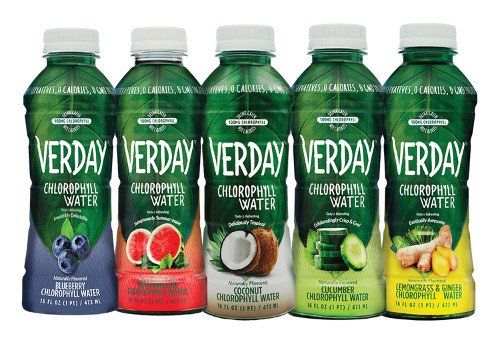Healthier Soft Drinks to Wet Your Whistle
Healthy soft drink choices see less sugar and more coconut and kombucha.
Photo from Verday

Health continues to be a key area of interest in the soft drinks market, with nearly 63% of global launches recorded by Innova Market Insights in the 12 months to the end of June 2017 carrying a health claim of some kind. This figure rises to nearly 74% in the United States, where an interest in health has long been a feature in product choices.
Within the fairly fragmented soft drinks market, the use of health positionings varies by sub-category. Some 90% of flavored bottled water and 100% for energy drink launches had a health claim, while a still substantial 50+% of carbonates did so.
Oh, So Sweet
Juice/juice drinks was the leading soft drinks sub-category in terms of overall launch activity, representing nearly 30% of the U.S. total. These beverages inherently carry a fairly healthy image, with more than three-quarters of launches having health claims. Nonetheless, the juice/juice drinks sub-category has been facing falling sales as concerns over sugar content rise.
The launch of lower-sugar options into the sub-category has been an area of particular interest, but is limited to non-100% juice products. The use of sugar-free, no-added-sugar, and low-sugar positionings were featured in 32% of U.S. juice drink launches in the 12 months to the end of June 2017.
The use of stevia as a natural sweetener has had a relatively high profile in recent years, with soft drinks being a major application area. The use of stevia by some of the world’s leading carbonate brands, such as Coca-Cola with Coca-Cola Life, has been the subject of much publicity, though the use of stevia in this category has not really taken off as one might have been expected.
Stevia was featured in just over 9% of U.S. soft drink launches in the 12 months to the end of June 2017, with the most common applications being drink concentrates and mixes, flavored bottled water, and juice/juice drinks. Drink concentrates and mixes led the pack, accounting for one-quarter of U.S. soft drinks launches featuring stevia in 2016, ahead of flavored bottled water with 21%, juices/juice drinks with 20%, and iced tea with 13%.
Tea Time
The iced tea market is relatively established in the United States, but it is still seeing good growth overall, boosted by a natural and healthy image, with some consumers now switching from carbonates. The added convenience of ready-to-drink teas has driven the sub-category forward at the expense of more traditional bag and loose-leaf teas.
Not only do convenient ready-to-drink teas come in several varieties outside of just black and green (e.g., white, red, oolong, and numerous herbal and botanical options), but they are also available in a range of hybrid products that feature juices and fruit flavors, as well as in newer sectors such as sparkling teas, tea lattes, and coffee–tea blends. Japanese-style green matcha tea is also growing in popularity, both alone and as an ingredient in other products.
Another key growth area has been the rising availability of kombucha products. Although the fermented, lightly effervescent black or green tea drinks have been available in the United States for some years, interest in functional beverages has moved them from the specialty sector further into the mainstream.
Over 20% of iced tea launches in the 12 months to the end of June 2017 featured kombucha in several flavors and formats, with numbers up by nearly two-thirds over the previous year, although still from a relatively small base.
A review of product activity indicates the high penetration level of organic kombucha options, with launches in recent months including organic kombucha from Wild Tonic (Cottonwood, AZ) and Simple Truth (Cincinnati, OH). Kombucha is also being blended with ingredients outside the tea market, as illustrated by the range of kombucha and kefir beverages from One Breath Beverage (Hood River, OR).
Water, Water Everywhere
Activity in plant-based waters has been rising in line with interest in plant-based diets overall, with U.S. launches nearly tripling over a five-year period. Actual numbers remain relatively modest, but they have overtaken energy drinks and trail just behind unflavored bottled water. They have a strong health image, with over 80% of launches in the 12 months to the end of June 2017 carrying a health claim of some kind.
The sub-category is currently dominated by coconut water, which has seen rising levels of use in recent years in non-traditional markets, particularly in North America. It is featured in nearly 70% of the plant-based waters launched in the United States, with a growing variety of flavors and added ingredients, including coffee, tea and cocoa, as well as a range of fruit juices.
Meanwhile, other newly launched plant-based waters feature a range of ingredients, including aloe, almond, and chlorophyll. The Chlorophyll Water range from Verday (New York, NY) was extended in 2017 with a new blueberry variety. Like the others in the range, it is zero calorie, sweetener and preservative free. and positioned on gluten-free, non-GMO, paleo and vegan-friendly platforms.
Health continues to be an overall issue, but other factors also influence choice and are driving product development, including convenience, novelty, hydration, refreshment, and indulgence. With this background, new product activity is likely to continue apace, as companies look for something new not only to add value and profitability to their existing ranges, but also to differentiate their products from the competition.

Prinova acquires Aplinova to further increase its footprint in Latin America
April 7th 2025Prinova has recently announced the acquisition of Brazilian ingredients distributor Aplinova, which is a provider of specialty ingredients for a range of market segments that include food, beverage, supplements, and personal care.





















